Growing organizations often face a critical challenge: their teams are busy executing projects, but the big-picture strategy feels disconnected from the daily grind. This gap between effort and strategic impact isn’t about a lack of hard work; it’s about a lack of clarity in how work is structured and aligned toward common goals. When every initiative is treated the same, resources get stretched, and the true value of the work gets lost.
This article offers a clear, concise overview of the core differences between program management and project management , helping you quickly identify which approach best fits your organization’s needs. Program management coordinates multiple related projects to achieve broad, strategic goals, while project management delivers specific outputs within defined timelines and budgets.
By understanding each role’s unique focus and requirements, teams can align their work for greater strategic impact. We’ll also outline how monday work management empowers both approaches, providing the flexibility and visibility needed to connect daily execution with big-picture objectives.
What is program management?
Program management involves coordinating multiple related projects to achieve strategic benefits that cannot be obtained by managing projects individually. What is program management exactly? It’s the practice of overseeing collections of interconnected initiatives that work together toward common organizational goals.
Program managers orchestrate complex transformations like digital modernization efforts that span cloud migration, cybersecurity upgrades, and employee training. Each component project delivers specific results, but the program ensures they align to create lasting organizational change that drives competitive advantage.
Strategic focus and long-term outcomes
Programs are designed around strategic objectives rather than tactical deliverables. The scope adapts to changing business needs and evolving organizational priorities, making flexibility a core characteristic of effective program management.
Key program characteristics demonstrate the difference between program and project management. Programs maintain strategic alignment with organizational goals, feature adaptive scope that evolves with business needs, and measure success through benefits-driven metrics rather than simple completion rates.
monday work management supports program-level visibility through portfolio dashboards and cross-project reporting, enabling leaders to track progress across multiple initiatives simultaneously while maintaining strategic focus.
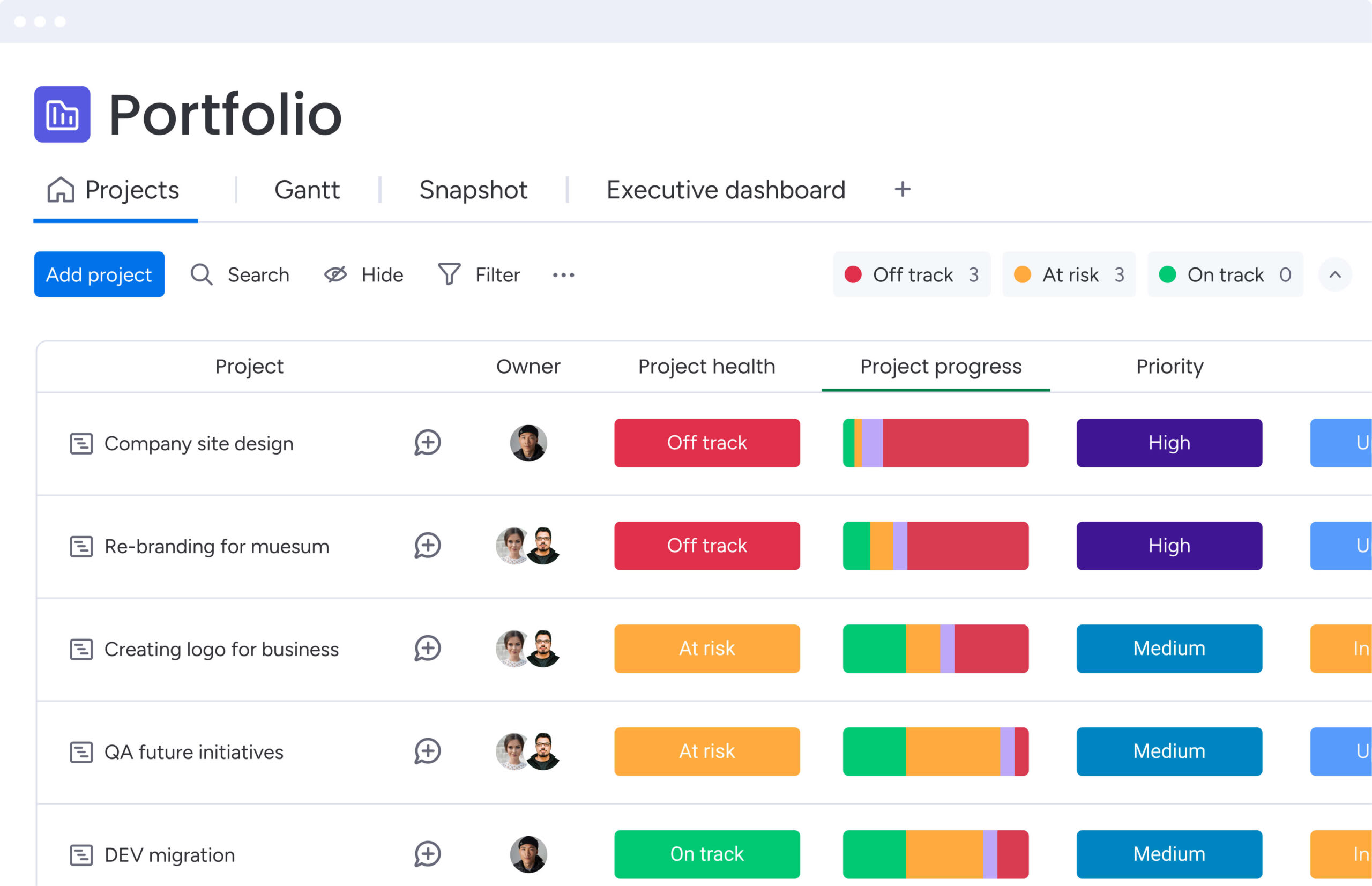
Benefits realization and governance
Programs use structured governance to ensure strategic value delivery. Steering committees, benefit tracking systems, and regular strategic reviews help maintain alignment with organizational objectives while adapting to market changes.
The difference between program management and project management becomes clear in governance approaches — programs require ongoing strategic oversight while projects need tactical execution management.
What is project management?
Project management involves planning, executing, and closing temporary endeavors with defined start and end dates to create unique products, services, or results. Projects are characterized by specific deliverables, fixed timelines, and constrained resources.
What does a program manager do versus what project managers handle? Project managers coordinate day-to-day activities to ensure deliverables are completed on time and within budget. A website redesign, office relocation, or software implementation represents typical projects with clear objectives and endpoints.
Tactical execution and defined scope
Projects operate within well-defined boundaries with specific requirements and constraints. The project scope is typically fixed at the beginning, with changes managed through formal change control processes.
Project characteristics include these essential elements that distinguish project vs program approaches:
- Temporary duration: clear start and end dates with defined milestones
- Specific deliverables: tangible outputs or measurable results
- Defined scope: fixed boundaries with established requirements
- Resource constraints: limited budget, timeline, and team members
monday work management provides project-level tracking with Gantt charts and milestone views, making it easier to monitor progress and adjust plans while maintaining scope control.
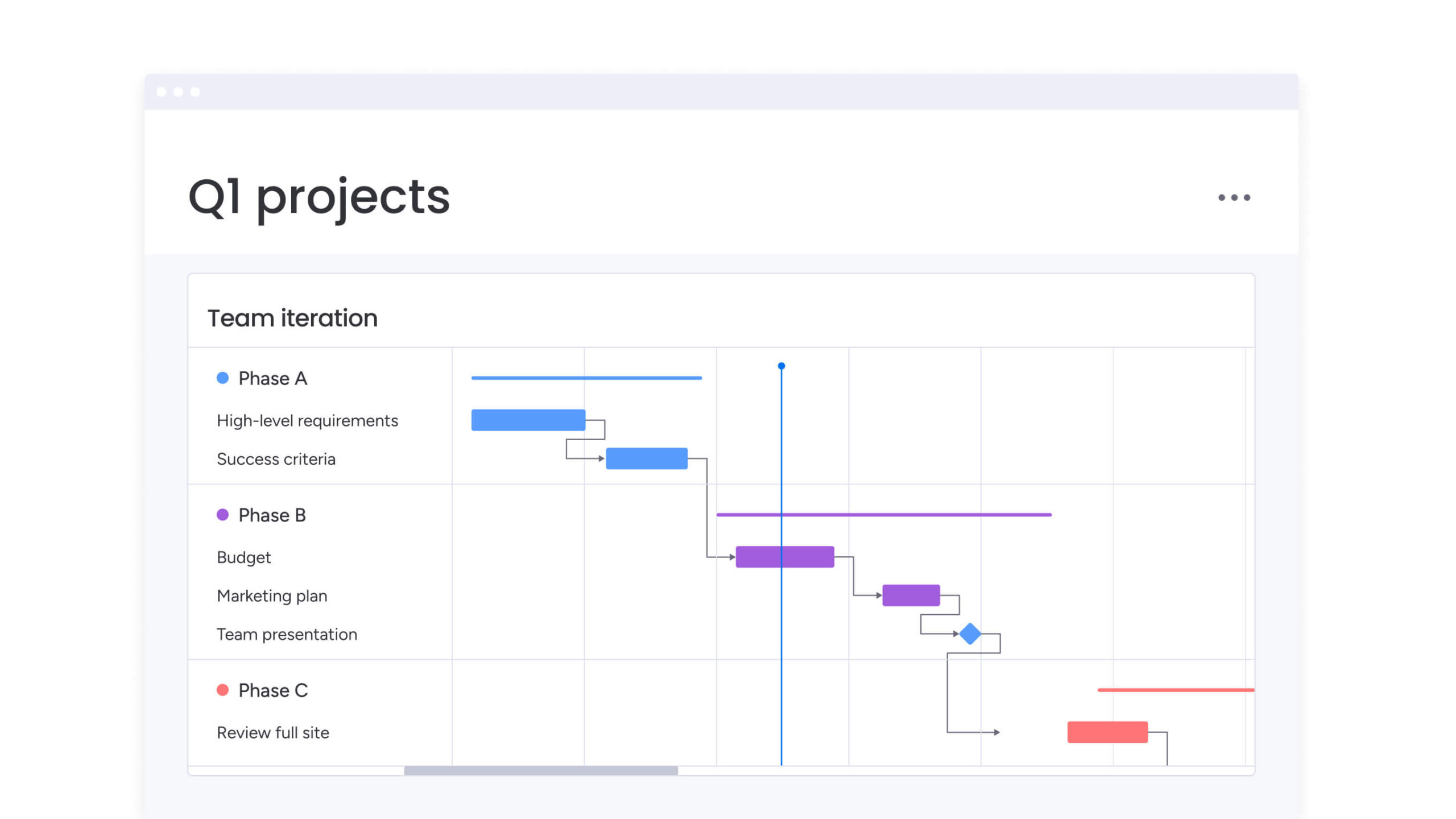
Key differences between program and project management
The difference between program management and project management centers on scope, duration, and strategic focus. Understanding what is the difference between program and project management helps organizations choose the right approach for their specific needs.
Scope and complexity differences
Program scope resembles orchestrating a symphony — multiple instruments working together to create harmonious outcomes. Project scope is more like a solo performance — focused, defined, and self-contained.
The difference between project and program complexity involves managing stakeholder relationships and interdependencies across organizational boundaries. How do you determine whether your initiative requires program vs project management? Consider the breadth of impact, duration of effort, and strategic importance to your organization.
Stakeholder engagement approaches
The difference between program manager and project manager responsibilities becomes evident in stakeholder management. Program managers engage with diverse stakeholders across departments and leadership levels, requiring strategic communication skills.
Project managers typically work with stable, project-specific teams and focus on tactical coordination within defined boundaries. This distinction highlights the project manager and program manager difference in daily responsibilities and required skill sets.
Try monday work managementHow these roles work together in organizations
Program and project management work together to address different organizational needs. The difference between a project manager and a program manager lies in their complementary functions rather than hierarchical superiority.
Coordination and resource allocation
Program managers provide strategic direction and allocate resources across multiple projects. They set priorities, manage cross-project dependencies, and ensure alignment with organizational objectives.
Project managers execute within the framework established by program managers, providing feedback that helps adjust strategies as needed. This collaboration demonstrates how program and project management create synergistic value for organizations.
monday work management supports this collaboration with shared dashboards and cross-project visibility, enabling seamless coordination between program and project levels while maintaining strategic alignment.
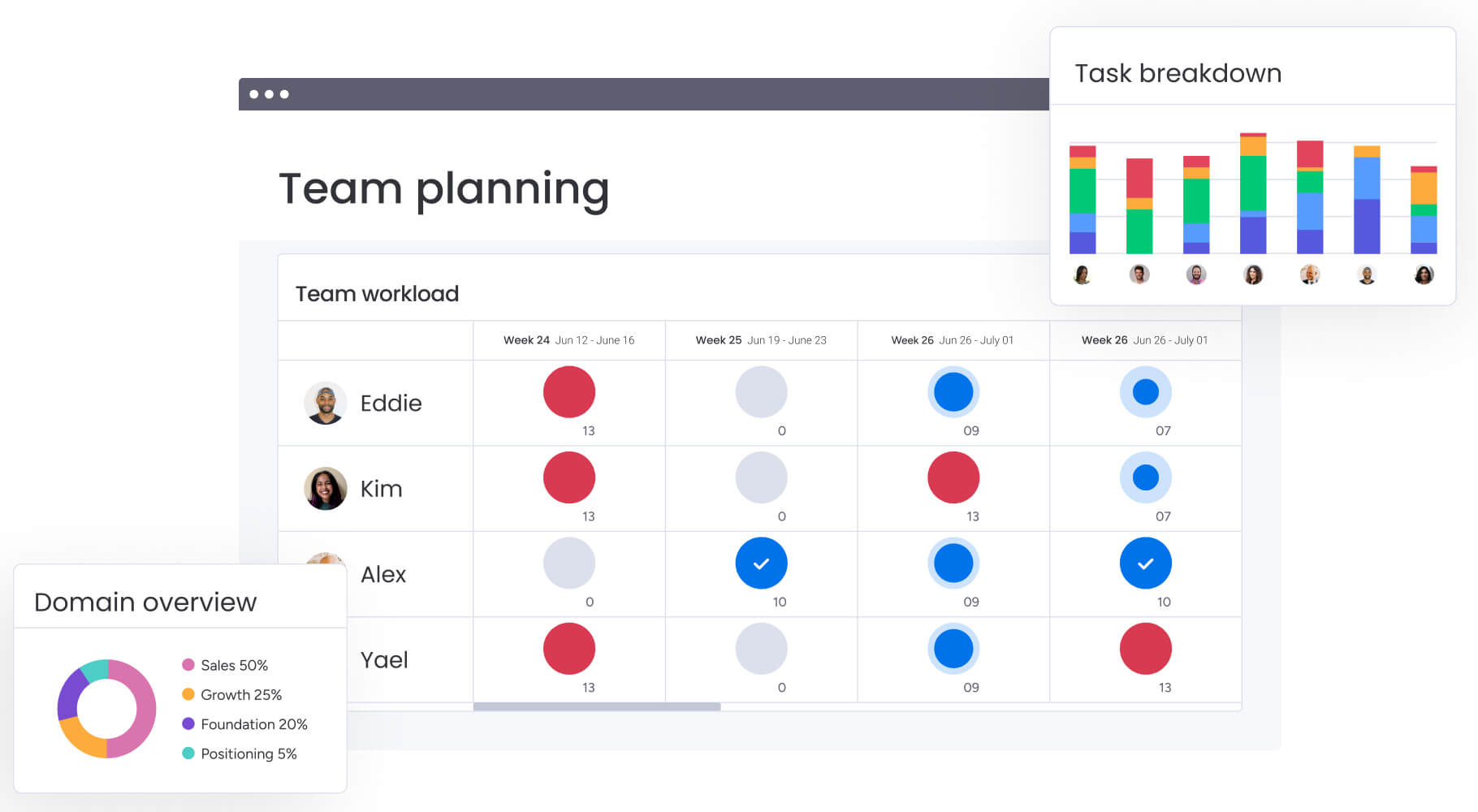
Strategic alignment and execution
Program managers define the “what” and “why” while project managers focus on the “how” and “when.” This division ensures strategic initiatives are properly executed while maintaining tactical efficiency.
The program manager versus project manager dynamic creates organizational capability that adapts to changing conditions while maintaining execution momentum through regular communication and feedback loops.
7 skills you need for both program and project management
Both program and project management require core competencies that enable effective leadership and execution—a need underscored by Gartner’s survey of 373 project management leaders highlighting the “next-generation” skills now expected in the discipline. These skills are essential for anyone pursuing either career path or for organizations building management capabilities.
Understanding what do program managers do versus project manager responsibilities helps identify the skill overlap and distinctions. Both roles share fundamental competencies while applying them at different organizational levels and scopes.
1. Strategic thinking and business acumen
Both roles require understanding organizational goals, though at different levels. Program managers need enterprise-level strategic thinking for board presentations and long-term planning.
Project managers align individual projects with broader strategy and understand how their deliverables contribute to organizational success. This skill demonstrates the project vs program management focus difference.
2. Communication and stakeholder engagement
Effective communication is crucial for both roles but manifests differently based on scope and audience; Gallup research shows employees who strongly agree they understand what’s expected are 47% less likely to experience frequent burnout, underscoring the value of clear direction from project and program leaders. The difference between a program manager and a project manager becomes evident in communication approaches and stakeholder complexity.
Key communication skills include executive-level presentations for strategic updates, cross-functional alignment across departments, team-level coordination for daily operations, and status reporting for tactical progress updates.
3. Risk and change management
Both roles manage uncertainty but at different scales and timeframes. Program managers handle strategic risks and organizational change across multiple initiatives while project managers address tactical risks within individual projects.
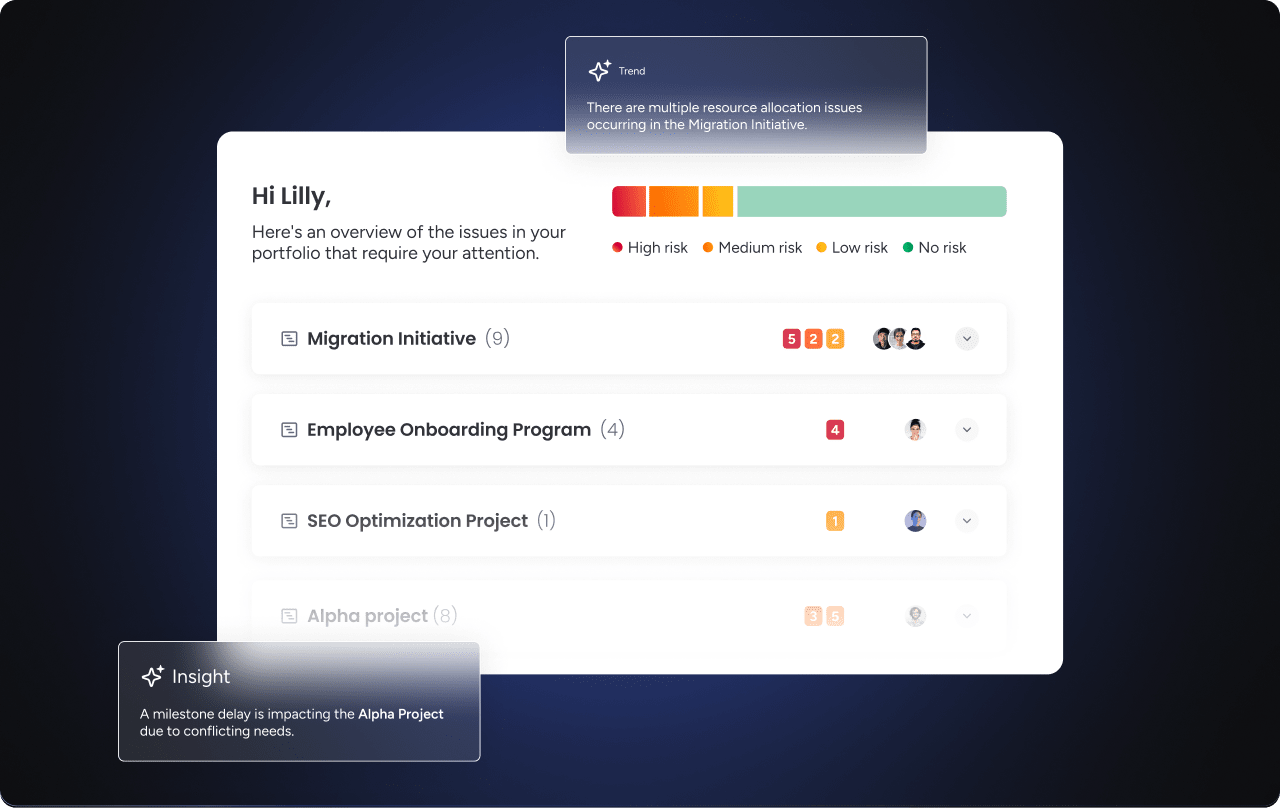
4. Planning and resource management
Planning skills are fundamental to both roles but applied differently based on scope and duration. Program managers develop high-level roadmaps and resource allocation strategies across portfolios.
Project managers create detailed work breakdown structures and task schedules for specific deliverables. This distinction illustrates the project versus program management planning approaches.
5. Leadership and team motivation
Both program and project managers must inspire, guide, and motivate teams to achieve shared goals. Leadership in these roles involves fostering collaboration and problem-solving, helping teams navigate obstacles, and empowering individuals to take ownership of their work.
Program managers often lead diverse, cross-functional groups working toward long-term strategic outcomes, while project managers focus on energizing project-specific teams to deliver results within set parameters.
6. Problem-solving and adaptability
The ability to solve problems efficiently and adapt to changing circumstances is vital in both disciplines. Whether it’s resolving a resource conflict or pivoting in response to shifting organizational priorities, successful managers must think creatively and remain flexible.
Program managers adapt solutions at a broad, strategic level, whereas project managers manage adjustments within the defined scope of their projects.
7. Financial and budget management
Effective financial oversight is crucial in both program and project management, though the scale and complexity may differ. Program managers oversee larger budgets spanning multiple initiatives, ensuring resources are allocated strategically to maximize benefit realization.
Project managers control the budget for individual projects, monitoring expenses to keep the work on track and within approved limits. Strong financial acumen in both roles directly impacts the success of organizational objectives.
Try monday work managementChoosing the right approach for your business needs
Organizations should select program or project management based on their specific context and objectives. The choice between project management vs program management depends on the nature of your initiative and desired outcomes.
When to prioritize program management
Program management excels for strategic transformation initiatives requiring coordinated efforts across multiple areas. Organizations benefit from program management when managing complex interdependencies or pursuing long-term value creation.
Examples that require program vs. project management approaches include companies undergoing digital transformation, launching product lines across regions, or integrating multiple acquisitions. These situations require sustained focus beyond individual project timelines.
When to focus on project management
Project management excels for initiatives with specific deliverables, limited scope, fixed timelines, or standalone value. The project vs program decision becomes clear when requirements are well-understood and work is contained within single departments.
Examples include launching marketing campaigns, upgrading office equipment, or developing mobile applications. What type of initiative are you planning? Consider the scope, duration, and strategic importance to determine the most effective management approach.
monday work management supports both approaches with customizable workflows that adapt to your specific needs, whether you’re managing individual projects or coordinating complex programs.
Modern platforms for program and project success
Various platforms support program and project management, each serving different organizational needs and preferences. The right platform choice depends on your team size, complexity requirements, and integration needs.
Comprehensive work management solutions
monday work management offers capabilities for both program and project management through portfolio dashboards, cross-project reporting, and customizable workflows. The platform’s AI-powered features help with resource allocation and risk identification while scaling from individual projects to enterprise-wide programs.
The difference between project and program requirements often determines platform selection. Programs need strategic visibility and cross-project coordination while projects need detailed task management and milestone tracking.
Integration and scalability considerations
Modern organizations need platforms that integrate with existing systems and scale with growing requirements—especially as 82% of employees now rely on work/project management software to track tasks and collaborate. The ability to connect with communication platforms, file storage systems, and business applications becomes crucial for seamless workflow management.
Project program management requires platforms that support both tactical execution and strategic oversight, enabling organizations to transition from project to program management as their needs evolve.
Try monday work managementElevate your organization's workflows
Successful organizations need both program and project management capabilities to achieve their strategic objectives. Programs deliver transformational outcomes while projects deliver specific outputs — both are essential for organizational success.
The choice between program management vs project management depends on your specific context rather than the inherent superiority of either approach. Strategic initiatives benefit from program management’s coordinated approach, while tactical deliverables succeed with project management’s focused execution.
The flexibility of monday work management supports both approaches within a single system, enabling organizations to scale their management capabilities as needs evolve and strategic priorities shift.
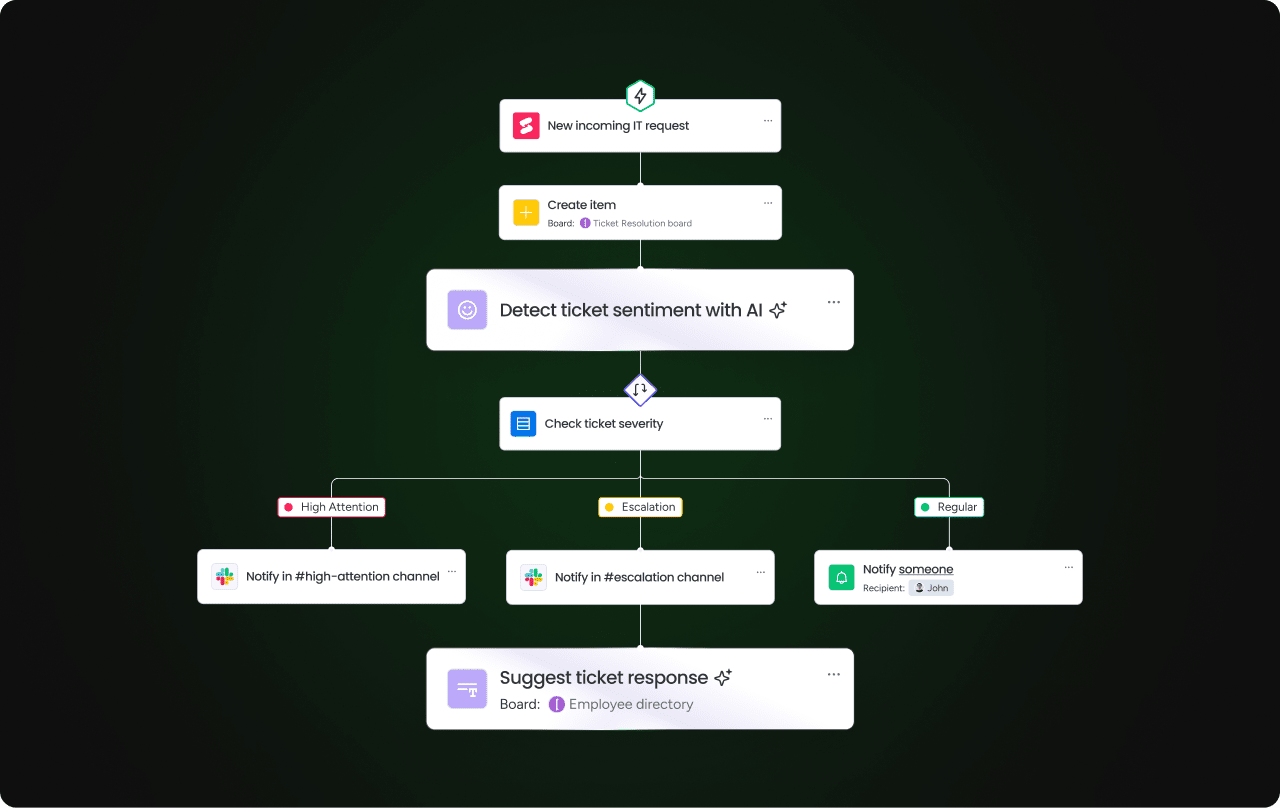
Frequently asked questions about program and project management
What is the difference between project management and program management?
The difference between project management and program management is scope and strategic focus. Program management coordinates multiple related projects to achieve strategic organizational benefits, while project management executes individual temporary endeavors with specific deliverables and timelines.
Is a program manager position higher than a project manager in most organizations?
A program manager position typically operates at a more strategic level and may oversee multiple project managers, but both roles serve essential organizational functions rather than representing a strict hierarchy. Both positions are valuable and address different business needs.
What does a program manager do compared to a project manager?
A program manager coordinates multiple related projects to achieve strategic benefits and focuses on long-term organizational outcomes. A project manager plans and executes individual projects with specific deliverables, timelines, and budgets within defined scope boundaries.
Can a single project manager effectively handle an entire program?
A single project manager can handle an entire program only if they develop program management skills and the program's scope remains manageable. Most complex programs benefit from dedicated program management expertise due to the strategic coordination required across multiple initiatives.
What is a program in project management terminology?
A program in project management is a group of related projects, subprograms, and activities managed together to obtain benefits not available from managing them individually. Programs focus on strategic outcomes and benefits realization rather than specific project deliverables.
How do program and project management work together in organizations?
Program and project management work together through complementary roles where program managers provide strategic direction and resource allocation while project managers execute individual initiatives. This collaboration ensures strategic alignment while maintaining tactical execution efficiency across the organization.

